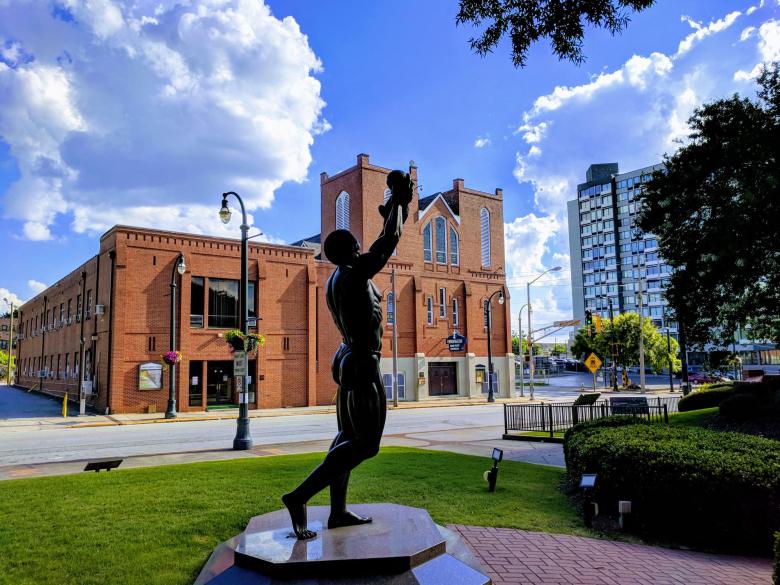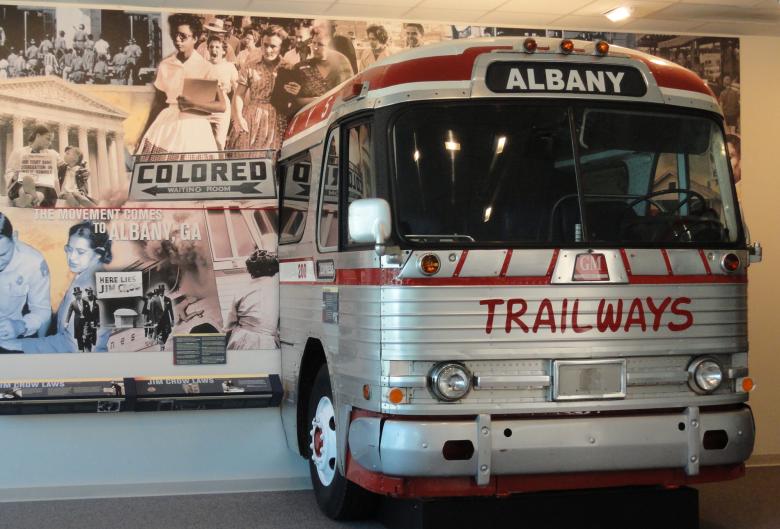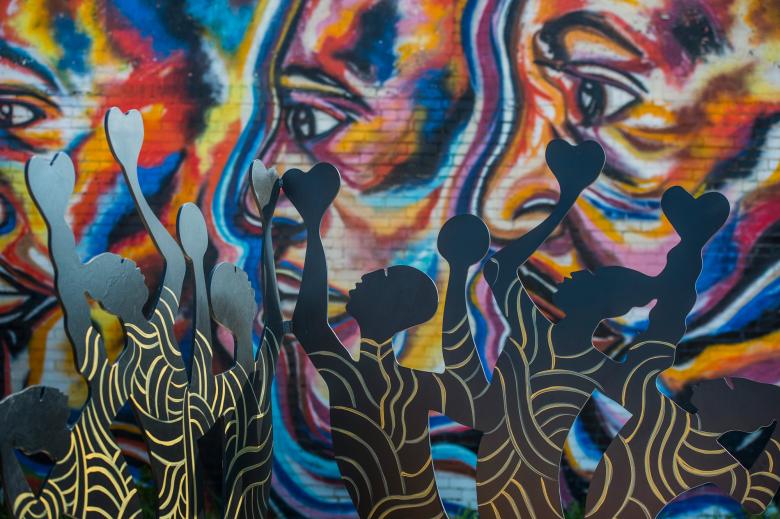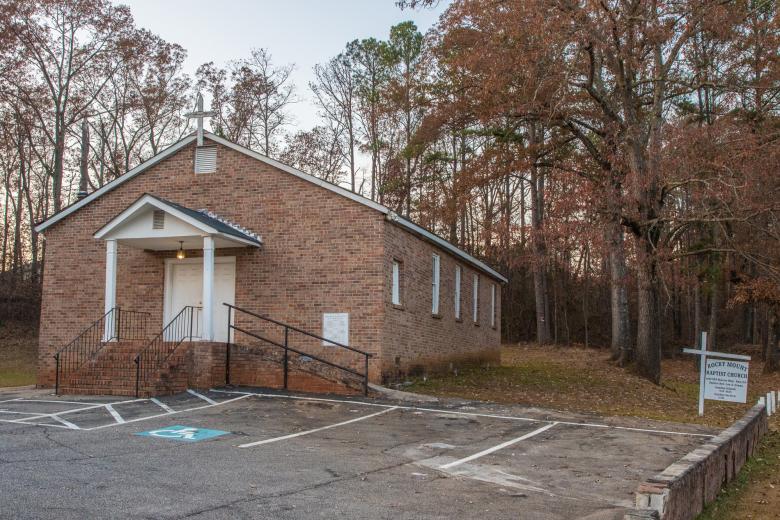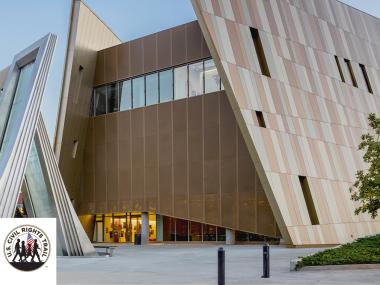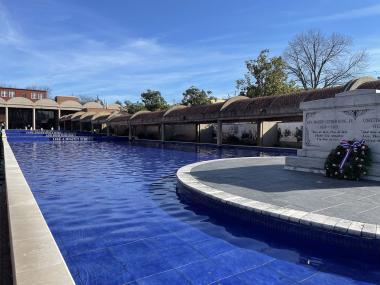Georgia's Footsteps of Dr. Martin Luther King, Jr. Trail
Feel closer to the events and the leader of sweeping social change at 28 sites in Georgia, including the the Martin Luther King, Jr. birthplace in Atlanta, that tell the important stories of how civil rights leaders advanced social justice and shifted the course of history.
Georgia is often considered the home of the American Civil Rights Movement because many key events were organized or enacted here. The life and legacy of Dr. Martin Luther King, Jr. is felt all across the state where he was born, raised, preached and shaped a foundation that would lead him to becoming an icon of peace.
This collection of museums, schools, churches and other landmarks tell the important stories of how Georgia's Civil Rights leaders advanced social justice and shifted the course of history. From the birth home of Dr. Martin Luther King, Jr. in Atlanta to a historic school and meeting place for civil rights leaders on the Georgia coast, follow the footsteps of the dream and witness the memories from Georgia's civil rights past.
The 28 attractions on Georgia's Footsteps of Dr. Martin Luther King, Jr. Trail are located in eight cities (click to jump to each section):
Martin Luther King, Jr. National Historical Park
The experience at the Martin Luther King, Jr. National Historical Park begins when you approach the Visitor Center, passing by the Civil Rights Walk of Fame with shoe imprints of pioneers in the American Civil Rights Movement noted in the pavement. Along the walk is a statue of Mahatma Gandhi with inscribed quotes from the India leader who greatly influenced King’s nonviolent movement for social change. The Visitor Center is surrounded by pathways and the International World Peace Rose Garden.
Martin Luther King, Jr. Birth Home
Take a free guided tour of the home where Martin Luther King, Jr. was born on Jan. 15, 1929, and lived until he was 12 years old. Located one block east of Historic Ebenezer Baptist Church in the residential section of the Auburn Avenue Historic District, the Queen Anne-style, two-story house has been restored to its appearance during King’s childhood. Free tours of Dr. King’s birth home are conducted hourly by the National Park Service. Registration is required at the Martin Luther King, Jr. National Historical Park Visitor Center and must be made in person upon arrival. Tours are limited to 15 people.
Note: The Birth Home will be closed through January 2026 for rehabilitation work.
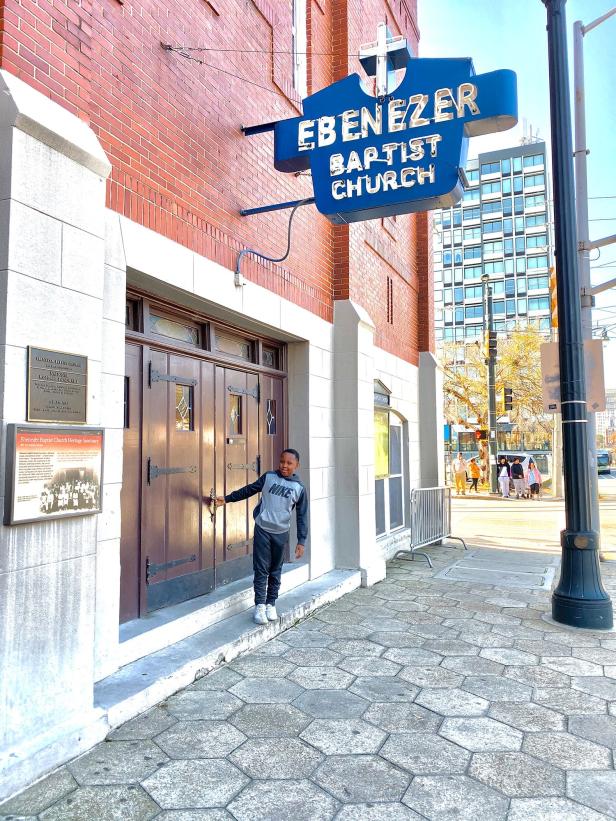
Historic Ebenezer Baptist Church in Atlanta. Photo by @kodysworld2
Historic Ebenezer Baptist Church
As part of your visit to the Martin Luther King, Jr. National Historical Park, tour the Historic Ebenezer Baptist Church to see where Dr. King served as co-pastor with his father. Rev. Martin Luther King, Sr. was Ebenezer’s third pastor, leading the church from 1933 until he retired in 1975. His son, Dr. Martin Luther King, Jr., served as co-pastor in 1947 until he attended Crozer Theological Seminary. He co-pastored Ebenezer again with his father from 1960 until his assassination on April 4, 1968. See the sanctuary and fellowship hall that have been restored to their 1960s appearance.
The King Center
In 1968, Coretta Scott King established the Martin Luther King, Jr. Center for Nonviolent Social Change (The King Center), and it moved to its present location in 1981 adjacent to Historic Ebenezer Baptist Church and the National Historical Park. Visit the outdoor memorial with Dr. Martin Luther King, Jr. and his wife Coretta Scott King’s crypt surrounded by reflecting pools and an eternal flame. Follow the walkway into Freedom Hall to see art from Africa and Georgia, and browse exhibits that honor Dr. and Mrs. King, Mahatma Gandhi and Rosa Parks. Don’t miss the bookstore/gift shop and resource center.
Prince Hall Masonic Temple
The Prince Hall Masonic Temple, located in the Sweet Auburn Historic District, was the headquarters for the Southern Christian Leadership Conference (SCLC) during the 1960s and is a component of the Martin Luther King, Jr. National Historical Park. In 1957, following the successful Montgomery bus boycott, Dr. Martin Luther King, Jr. invited 60 black ministers to Ebenezer Baptist Church to form an organization to support nonviolent direct action to eliminate segregation in public accommodations and secure voting rights. Dr. King was elected president of the organization, and a small office was established in the Prince Hall Masonic Temple. SCLC staff included Ella Baker, Andrew Young and Dorothy Cotton. Following Dr. King’s assassination, Rev. Ralph David Abernathy led SCLC operations at this location.
APEX Museum
Located in the historic Atlanta School Book Depository building in the heart of Atlanta’s Sweet Auburn Historic District, the APEX Museum is dedicated to telling the story of the people of the African Diaspora and their contributions to America and the world. Visit the museum to see art and photographic exhibits that celebrate the complete history of African Americans.
Big Bethel A.M.E. Church
One of the iconic churches in the Sweet Auburn Historic District, Big Bethel A.M.E. Church stands out on the Atlanta skyline with its Jesus Saves sign on the church steeple. The church was founded in 1840 for enslaved members of the white Union Church, and it served many functions during the Civil War, including a hospital. During Reconstruction, Bethel A.M.E. housed Atlanta’s first public school for African Americans and Morris Brown College in the basement. Big Bethel A.M.E. Church ministry has focused on civil rights since the movement days, from broadcasting sermons on Atlanta’s WERD radio stations to building low-income housing units, and providing services to poor and imprisoned people.
Virtual Sunday services are held 10 a.m. and 2 p.m. Find more information on the church's website.
Wheat Street Baptist Church
Wheat Street Baptist Church was organized during Reconstruction to serve the African American communities in the Sweet Auburn and Old Fourth Ward neighborhoods. Under the leadership of Rev. William Holmes Borders leading up to the Civil Rights Movement, the church acquired land for development of Wheat Street Gardens for low-income housing and Wheat Street Towers, a high-rise building for seniors, which are managed by the Wheat Street Charitable Foundation and provide affordable housing in the Sweet Auburn Historic District. Wheat Street also established one of the first federal credit unions in the South. Visitors are invited to attend worship services on Sunday mornings.
Virtual Sunday services are held at 10:30 a.m. Find more information on the church's website.
Sweet Auburn Historic District
Nestled in the heart of Atlanta, centered along a mile and-a-half stretch of Auburn Avenue, the Sweet Auburn Historic District houses one of the city’s most important historical African American communities. Since the late 19th century, the district has been home to numerous African American-owned businesses and schools, many the first of their kind in Atlanta or the nation. The Martin Luther King, Jr. National Historical Park, Big Bethel A.M.E. Church and King Center are all important features of the district, along with the popular Municipal Market. The neighborhood is represented by Sweet Auburn Works, the district’s voice for implementing Main Street projects and activities that promote commerce, visitation and sustainability of historic places.
Milton's Drugstore
At the former site of Yates & Milton Drug Store (presently the Student Center on the campus of Clark Atlanta University), a Georgia Historical Society marker tells the story of the Atlanta Student Movement that began in 1960. The movement began when three Morehouse College students — Lonnie King, Joseph Pierce and Julian Bond — formed the Committee on the Appeal for Human Rights and involved all the historically black institutions of the Atlanta University Center (AUC). After Roslyn Pope of Spelman College published “An Appeal for Human Rights,” the AUC students conducted sit-ins at segregated lunch counters throughout Atlanta, movie theaters, parks and the Georgia State Capitol. When the students targeted the Magnolia Room at Rich’s Department Store in downtown Atlanta, Martin Luther King, Jr. and his brother A.D. King joined them and were arrested with 77 student demonstrators. Protests involving more than 2,000 students at businesses continued until October 1961, when desegregation of the facilities was achieved.
Rush Memorial Congregational Church
Located near the campus of Clark Atlanta University, Rush Memorial Congregational Church became the headquarters for planning meetings of the Atlanta Student Movement. A Georgia Historical Society marker located in front of the church tells the story of the church’s support for the movement. As the student movement gained momentum, administrators at the black colleges would not allow the students to meet in campus facilities. Rev. Joseph E. Boone, a civil rights activist, provided an office space for students, and the congregation assisted with food and supplies.
Atlanta University Center's Robert W. Woodruff Library
Well-known as the repository for the Morehouse College Martin Luther King, Jr. Collection, the Atlanta University Center’s Robert W. Woodruff Library provides students and faculty with a state-of-the-art learning and research facility. Researchers can access the King Collection, which includes 1,100 books from Dr. King’s personal library with his handwritten notes and memorabilia from his civil rights activities. The Robert W. Woodruff Library also houses public meeting spaces, exhibits and the John Henrik Clarke Africana and African American collection.
South-View Cemetery
South-View Cemetery was founded in 1886 by formerly enslaved African Americans who protested the treatment they received at Atlanta’s segregated cemeteries. Rev. Martin Luther King, Sr. and his wife Alberta Williams King are interred in a marble crypt at South-View. When their son, Dr. Martin Luther King, Jr., was assassinated in 1968, his body was temporarily interred at South-View before being relocated to the Martin Luther King, Jr. National Historical Park.
South-View Cemetery offers docent-led walking tours featuring the gravesites of notable African American leaders as well as lesser-known African Americans who were significant in Atlanta’s history. Special group tours are available by reservation. The cemetery also offers a free self-guided cell phone walking/driving tour.
Hours: Daily 9 a.m. – 5 p.m.
The Jimmy Carter Presidential Library and Museum
The Jimmy Carter Presidential Library and Museum, administered by the National Archives and Record Administration, is the repository of information and historical materials from the Carter presidency. Browse the museum's photographs, videos and rotating material from the collection, and walk through a life-size replica of the Oval Office. Researchers can access the library archives that include more than 27 million pages of documents related to the Carter presidency.
National Center for Civil and Human Rights
The National Center for Civil and Human Rights is dedicated to the achievements of the American Civil Rights Movement as well as the worldwide human rights movement. See rotating artifacts from Dr. Martin Luther King, Jr.’s youth through his assassination in the “A Committed Life: The Morehouse College Martin Luther King, Jr. Collection” exhibit. Learn more about significant events in the movement and experience a simulation of a lunch counter sit-in demonstration in the “Rolls Down Like Water: The U.S. Civil Rights Movement” exhibit. Explore interactive exhibits about modern-day activism worldwide in “Everyone. Everywhere: Global Human Rights” exhibit.
Auburn Avenue Research Library
The Auburn Avenue Research Library (AARL) is located in the heart of the Sweet Auburn Historic District. The library opened in 1994 as a special branch of the AtlantaFulton Public Library System to provide reference and archival collections for scholarly research on African American culture and history. AARL originally was the Auburn branch of the Carnegie Library during segregation. Browse the library’s collections, including the Samuel W. Williams Collection on Black America, textual and microform records, and numerous databases on African American culture and the African Diaspora.
Martin Luther King, Jr. Statue at the Georgia State Capitol
The Martin Luther King, Jr. statue at the Georgia State Capitol was unveiled on Aug. 28, 2017. The bronze statue rises 8 feet atop a 36-inch pedestal with MLK engraved in gold on the Georgia granite. Atlanta-based sculptor Martin Dawe of Cherrylion Studios designed the bronze statue with King facing Liberty Plaza.
Morehouse College
Morehouse College, founded in 1867, is a historically black, private liberal arts college for men. One of the college’s most distinguished alumnus is Martin Luther King, Jr., who graduated in 1948. The Martin Luther King, Jr. International Chapel has hosted more than 1 million people for community and spiritual programs since it opened in 1978. The chapel features a 2,500-capacity auditorium, a 6,000-pipe organ and a Hall of Honor with 158 oil portraits of world leaders in the civil and human rights movement, and a bust of Mahatma Gandhi. On the adjoining plaza, the chapel memorializes two theologians. There, visitors can see a bronze statue of Dr. King, and the burial crypt and towering obelisk for Dr. Howard Washington Thurman.
Before your trip, review the visitation information on the college's website.
Albany Civil Rights Institute
Visit the Albany Civil Rights Institute (formerly known as the Albany Civil Rights Movement Museum at Old Mount Zion) to learn the story of the Albany Movement, a coalition of residents, churches and their congregations, students, and civil rights organizations that led a grassroots campaign to end discrimination in public facilities and achieve voters’ rights in southwest Georgia. The 12,315-foot facility is situated next to the Old Mt. Zion Baptist Church, a historic 1906 building that was the primary site of mass meetings.
Shiloh Missionary Baptist Church
Shiloh Missionary Baptist Church was another site where meetings were held during the Albany Movement. Working closely with Old Mt. Zion Baptist Church across the street, both churches held mass meetings with crowds exceeding 1,500 people when Dr. Martin Luther King, Jr. spoke to their members in 1961. A Georgia Historical Society Civil Rights Trail marker honoring the Albany Movement is located in front of the church.
Prince Hall Masonic Temple
The Prince Hall Masonic Temple in Columbus was the site of a speech that Martin Luther King, Jr. gave to an audience of more than 1,000 people in 1958 during his inaugural year as president of the Southern Christian Leadership Conference (SCLC). King’s visit was part of the emerging SCLC efforts to register black voters and encourage nonviolence in preparation for the 1960 presidential election.
King visited Columbus following the murder of Dr. Thomas Brewer, a Columbus leader who helped organize and finance King v. Chapman, the landmark U.S. Supreme Court decision that ended the white primary system in Georgia. Following the decision, Columbus blacks lived in constant fear of Klan bombings and cross burnings. The Prince Hall masons invited King so that the local black churches would not be subject to retaliation by local Klan activists. The Prince Hall Masonic Temple is one of 18 sites that comprise the MLK Jr. Outdoor Learning Trail, a project being developed by Columbus State University students.
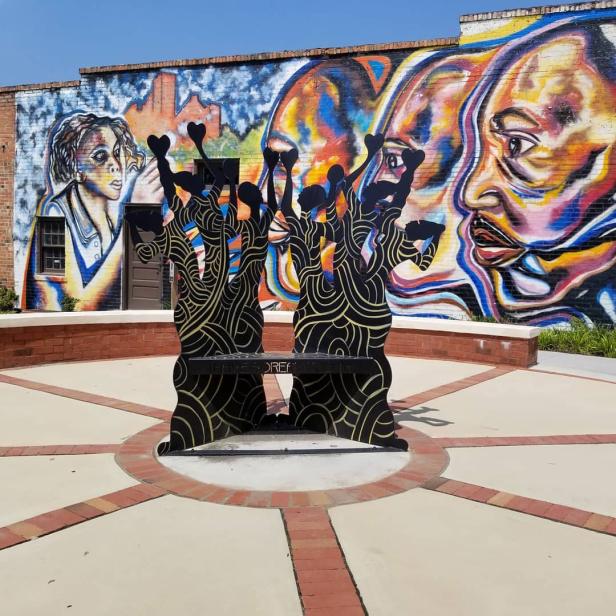
Martin Luther King, Jr. Monument Park in Dublin, Georgia. Photo by @maplover2
Martin Luther King, Jr. Monument Park
The Martin Luther King, Jr. Monument Park is located at the gateway to downtown Dublin across the street from First African Baptist Church. See the 54- foot-by-10-foot mural designed by Georgia artist Corey Barksdale that depicts a series of images highlighting the need for future generations to envision Dr. King’s message. A sculpture complements the park’s theme.
First African Baptist Church
First African Baptist Church was established in 1867. The current historic church building was constructed in 1914 and is Dublin’s oldest African American church. In 1944, the Colored Elks Club of Georgia sponsored an oratory contest at the church, and the winner was Martin Luther King, Jr. He was 15, and his speech was “The Negro and the Constitution.” On the ride back to Atlanta, he and his teacher were forced to relinquish their seats to white passengers. That incident left an indelible impression on the young King, who would later lead the Montgomery bus boycott. Listen to an audio tour in Monument Park that recaptures that experience and other memories of First African Baptist Church members during the Civil Rights Movement.
Dorchester Academy & Museum
Dorchester Academy, established in 1868, was one of the earliest private schools that educated freedmen. When the school closed in 1940, the academy served as the host site for Southern Christian Leadership Conference (SCLC) adult literacy and voter registration seminars. Martin Luther King, Jr. was frequently the keynote speaker at the conclusion of weeklong citizenship classes at Dorchester. In January 1963, SCLC Executive Director Wyatt Tee Walker and 11 SCLC staff, including King, Abernathy and Young, planned the strategy for the Birmingham Campaign at Dorchester, which would ultimately lead to Congress passing the Civil Rights Act of 1964. Visitors can see where Martin Luther King, Jr. slept and studied while he was at Dorchester, as well as browse exhibits about the school’s history.
Hours: Tuesday – Friday 11 a.m. – 2 p.m.
Saturday – Sunday 2 p.m. – 4 p.m.
Rocky Mount Baptist Church
The cemetery at Rocky Mount Baptist Church is the final resting place for Delia and James King, parents of Martin Luther King, Sr. and his sister Ruby. The cemetery has 167 memorials, including the gravesite of the King family, in its rural setting in Rex.
Virtual Sunday services are held at 11 a.m. Find more information on the church's website.
Floyd Chapel Baptist Church
Floyd Chapel Baptist Church has a long history as a safe haven for black worshipers in Stockbridge. It was moved to its present location in 1878. The current church was erected in 1949. Rev. Martin Luther King, Sr. worshiped at the wooden church that existed at the site with his mother Delia Lindsay King during his childhood. He was ordained and preached his first sermon at Floyd Chapel. King, Sr. would later succeed Rev. A.D. Williams as pastor of Atlanta’s Ebenezer Baptist Church. Stockbridge unveiled the M.L. King Sr. Heritage Trail in 2015, and a marker stands in front of Floyd Chapel to honor his legacy. Visit nearby Stockbridge City Hall to see a commemorative plaque that acknowledges the King family legacy.
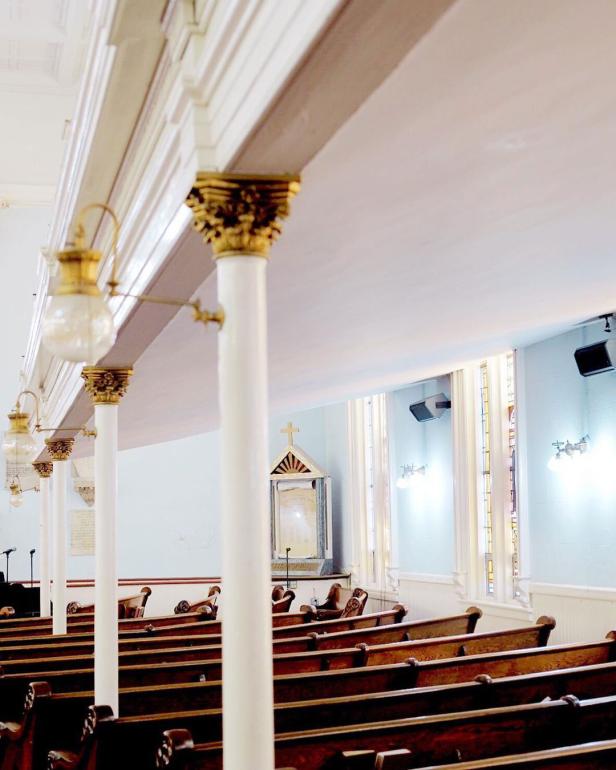
First African Baptist Church in Savannah. Photo by @genteelandbardsavannah
First African Baptist Church
First African Baptist Church is one of the oldest African American Baptist churches in North America. The church was organized in 1773 by Rev. George Leile, who preached to the enslaved people at Brampton Plantation.
In his dual role as president of the Savannah NAACP and pastor of First African Baptist Church, Rev. Ralph Mark Gilbert led numerous voter registration drives and demonstrations that led to integration of the Savannah Police Department and public facilities. During the 1960s, Dr. Martin Luther King, Jr. spoke at First African Baptist Church. In 2017, the Georgia Historical Society and First African Baptist Church erected a marker in front of the church on Franklin Square.
Virtual Sunday services are held at 10 a.m. Find more information on the church's website.
Ralph Mark Gilbert Civil Rights Museum
The Ralph Mark Gilbert Civil Rights Museum chronicles the Civil Rights Movement in Savannah, Georgia’s oldest city. The museum is named in honor of Rev. Ralph Mark Gilbert, who was the pastor of First African Baptist Church from 1939 to 1956 and president of the Savannah branch of the NAACP from 1942 to 1948. His civil rights legacy included establishment of the West Broad Street YMCA, hiring of Savannah’s first black police officers and voter registration drives for the NAACP. Explore photographs and interactive exhibits on the museum’s three levels that capture key civil rights struggles in Savannah, including demonstrations at Savannah’s Levy’s Department Store, and a theater with seating that resembles pews in African American churches.
Learn more about the civil rights landmarks in the links above, and plan your trip to explore historic locations and significant events in the American Civil Rights Movement in Georgia. Several of these sites also are included on the U.S. Civil Rights Trail, which includes more than 100 sites across 14 states.

